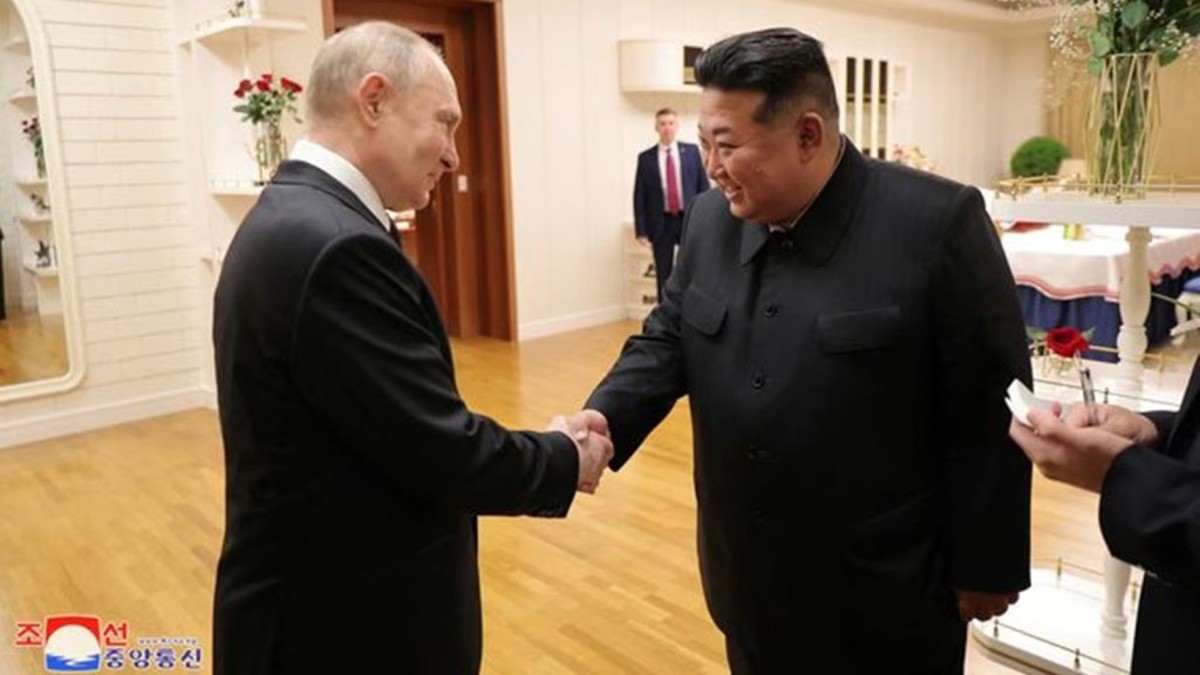President Vladimir Putin completed a state visit to the Democratic People’s Republic of Korea on Wednesday. This was his first official visit to the isolated nation in 24 years, where he was received at the airport by Kim Jong Un himself. The last time Putin visited Pyongyang was in 2000 for a summit meeting with Kim Jong Il, the father of Kim Jong Il.
On the occasion of this visit, Pyongyang city was decked out with Russian flags and portraits of Putin. The state media played Russian music to the leader’s delight.
The warmth extended by Kim Jong Un is a signal to the world that Putin is not isolated; his patronage is still prized in some parts of the globe. This visit also marks a key moment for Kim for two reasons: first, he received Putin for the very first time in North Korea, where on two previous occasions, both the leaders met at Vladivostok in the Russian Far East. Second, Kim had not hosted any of the world leaders of significance since the beginning of Covid-19. Therefore, Putin’s state visit, considering the current state of the global order, holds strategic significance not only for the North Korean leader but also for Russia.
Fragile World Order Fosterning New Alliance
The world order is in a major shift. After three decades of unipolarity, there are signs of multipolar world order on the horizon. The Russian Federation is being isolated globally by the West on the issue of Russian-Ukraine conflict. Sanctions from the West, especially from the US are tightening, and Russian assets are being frozen by the G7 countries thereby making its economy hang by a thread. In this context, Russia needs to hold on to its traditional allies and search for new ones.
The current geopolitical landscape is characterised by a multifaceted hegemonic competition between the United States and China, manifesting across political, economic, and military domains. This rivalry is exemplified by the ongoing trade tensions between the two nations and the recent congressional statements concerning Tibet. Concurrently, the deliberate decision by the US to pursue Ukraine’s admission into the North Atlantic Treaty Organization (NATO), an action perceived as antithetical to Russia’s national interests due to Ukraine’s role as a buffer state between NATO and Russia, has catalysed the Russian-Ukrainian conflict.
Impact Shorts
More ShortsMoreover, exacerbated by the stringent sanctions against them in response to their nuclear aspirations, the US has inadvertently facilitated the convergence of Iran and North Korea with China and Russia, leading into an emergence of anti-Western alignment.
Putin understands the significance of North Korea in the Pacific, which can keep the US busy in the Pacific and may act as a deterrent. Putin’s strategy is to counter the West, which can be done by gathering all common enemies of the West. Therefore, Putin’s visit holds a lesson to the West on what happens when you push a country to the brink.
Win-Win Agreement
The highlight of the summit was the signing of a landmark agreement between two countries. The new agreements replace the agreements signed in 1961, 2000 and 2001. In a significant move both countries elevated their bilateral ties to a ‘comprehensive strategic level’, akin to an “Alliance”. The document proposes a comprehensive partnership agreement covering political, military, economic and cultural cooperation founded on principles of mutual respect for sovereignty, non-aggression, non-interference, and equality while working towards global strategic stability and fair international order through strengthened cooperation.
It outlines activating communication channels and providing assistance in case of aggression or war while prohibiting treaties that infringe on each other’s core interests or allow violations. It allows for the preparation of joint actions to strengthen defence capabilities for maintaining peace and prosperity, and expanding collaboration across trade, economy, investment, science and technology.
The agreement supports regional and cross border economic cooperation, direct trade links, mutual recognition of product standards and certifications, as well as protecting each other’s legal entities and citizens through legal assistance and asset recovery. It promotes cooperation in tackling terrorism, transnational crimes, information security, equal rights in network management, public affairs, publications and disseminating objective information while combating false propaganda. The agreement also emphasises depper exchanges between legislative and law enforcement institutions, opposing unilateral coercive measures and collaborating in areas such as agriculture, education, health, sports, culture, and terrorism.
The clause on military assistance catches the worlds’ eye. Russia and North Korea have agreed to provide immediate military assistance if either country faces aggression or is pushed into a state of war.
The North Korean leader, Kim Jong Un, has pledged unwavering support and solidarity to Russia in the ongoing conflict with Ukraine. Over the years, the North Korean economy has been crippled by the imposition of Western sanctions, leaving Kim in need of securing essential resources such as food and fuel for his people. Coincidentally, Russia is a preeminent global exporter of wheat and a major energy supplier, presenting an opportunity for mutually beneficial cooperation. Furthermore, the sanctions regime has restricted countries from engaging in the transfer or sharing of strategic military technologies with North Korea, a void that Russia may potentially fill. The official visit and the consequent agreement between the two nations signify a convergence of interests, fostering the potential for collaborative efforts aimed at evading Western sanctions through mutual cooperation and giving rise to new Asian security architecture.
The author is a Research Assistant at Pondicherry University. The views expressed in the above piece are personal and solely those of the author. They do not necessarily reflect Firstpost’s views.


)

)
)
)
)
)
)
)
)



